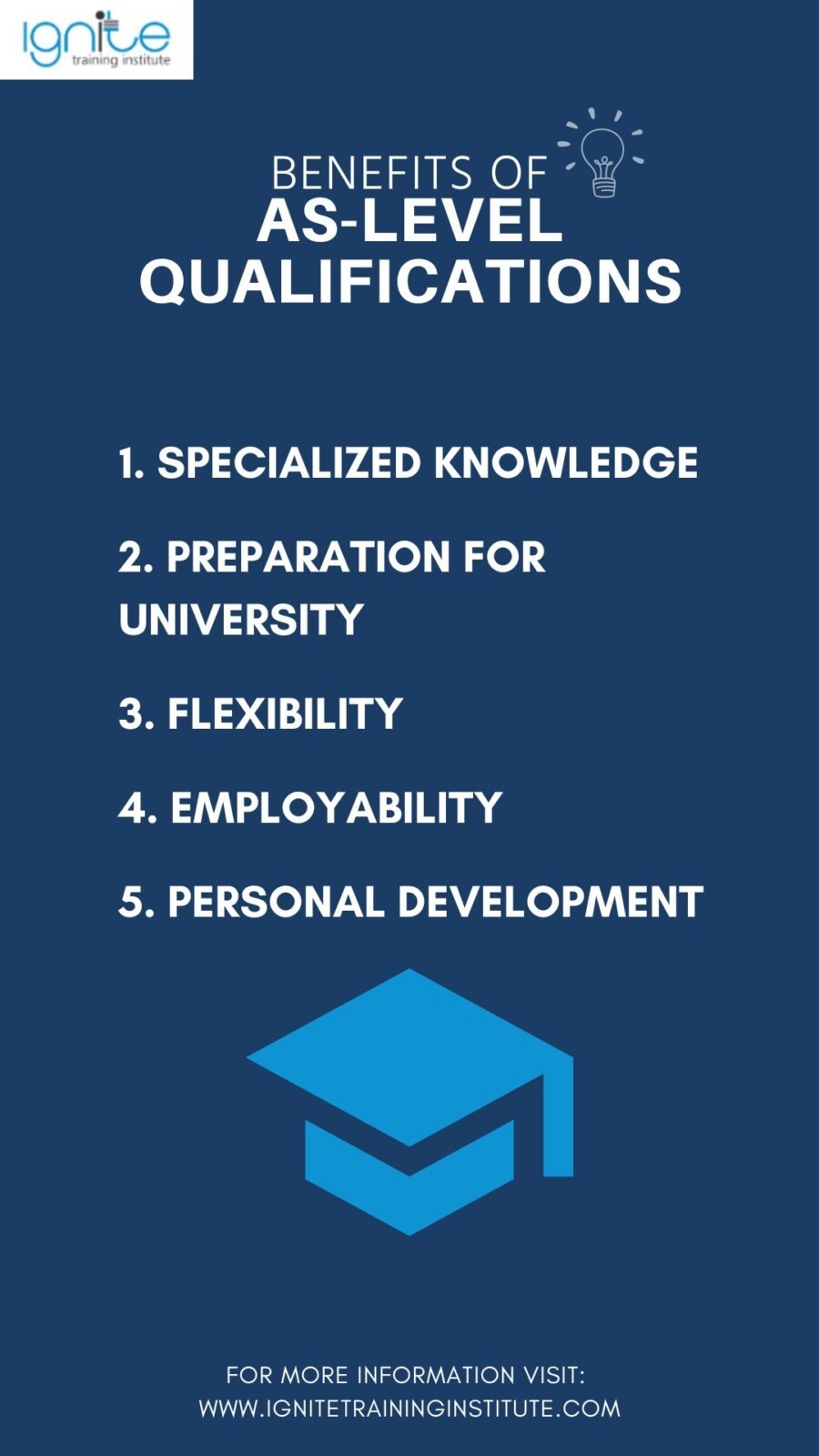AS-Level qualifications are an important part of the educational system in the United Kingdom and other countries around the world. These qualifications, which are typically taken in the first year of a two-year A-level course, are designed to provide students with a more specialized and in-depth understanding of a particular subject and to prepare them for further study at the college or university level.
Since AS-Level qualifications are often a stepping stone to full A-Levels, which many universities require for admission, having the right guidance is crucial. Ignite Training Institute provides expert AS Level Tutors and A Level Tutors to help students excel with personalized academic support. Book your free demo class today!
What Are AS-Level Qualifications?
AS-level qualifications are a type of academic qualification typically taken by students in the United Kingdom, as well as in some other countries. The acronym AS Levels stands for “Advanced Subsidiary Levels”.
AS-level qualifications are typically taken by students in their penultimate year of secondary education (usually at age 16-17) at the end of Year 12 (Grade 11). They are usually studied alongside other qualifications, such as GCSEs, and are often used as a stepping stone to full A-level qualifications.
AS-level courses typically cover half of the content of a full A-level course and usually take one year to complete. They cover the same subjects as A Levels but in less depth. Students may choose to take AS-level exams in a range of subjects, including English, Mathematics, Sciences, History, and Modern Languages, among others.
Students can choose to stop at AS Level or continue into the second year to complete the full A Level, which combines both AS and A2 Level content.
AS-level qualifications are assessed through both coursework and exams, with the exams taking place at the end of the one-year course. In many cases, students can choose to continue studying the subject at the A-level standard in their final year of secondary education.
However, the AS-level qualification is also a standalone qualification and can be used for a variety of purposes, including further study, employment, or university applications.
Related: Why It Is Absolutely Ideal To Choose The A-Levels?
What Is AS-Level Equivalent To?
The AS-Level, or Advanced Subsidiary Level, is a qualification taken by students typically in the UK, equivalent to the first year of a full A-Level course. It is often compared to the 11th-grade level in the US high school system or the first year of an International Baccalaureate (IB) diploma.
AS-Levels offer a foundational understanding of subjects and are often used to gauge a student’s aptitude before they proceed to the full A-Level qualification, which is considered a higher standard similar to the final year of high school in other education systems.
Related: A Level Computer Science Course: A CIE & AQA Overview
AS-Level Grades Overview
AS-level qualifications are typically graded using the A-E scale, with A being the highest grade and E being the lowest passing grade. Here is a breakdown of the grading system for AS-level qualifications:
- Grade A: This is the highest grade and indicates exceptional performance. It is awarded to students who have demonstrated a thorough understanding of the subject matter and have shown strong critical thinking skills.
- Grade B: This is a very good grade and indicates strong performance. It is awarded to students who have demonstrated a good understanding of the subject matter and have shown good critical thinking skills.
- Grade C: This is a solid passing grade and indicates satisfactory performance. It is awarded to students who have demonstrated an adequate understanding of the subject matter and have shown some critical thinking skills.
- Grade D: This is a weak passing grade and indicates less than satisfactory performance. It is awarded to students who have demonstrated a limited understanding of the subject matter and have shown little critical thinking skills.
- Grade E: This is the lowest passing grade and indicates poor performance. It is awarded to students who have demonstrated a minimal understanding of the subject matter and have shown no critical thinking skills.
It’s important to note that AS-level grades are not directly comparable to A-level grades, as the two qualifications cover different amounts of material and are assessed differently.
Related: How Are A-Level Qualifications (Advanced Level) Different?
How Are AS Level Grades Calculated?
AS Level grades are calculated based on the marks a student earns in a set of exams or assessments for a particular subject, typically taken at the end of Year 12. The grading scale ranges from A to E, with U (Ungraded) indicating a failing mark.
Each AS Level subject is assessed through externally marked examinations set by the respective exam board (such as Cambridge International or Edexcel). The raw marks obtained in these exams are converted into uniform marks or grade boundaries based on overall exam difficulty and student performance that year.
Here’s a general guide to the Cambridge International AS Level grading scale (subject to variation by exam board):
- A = 80–100%
- B = 70–79%
- C = 60–69%
- D = 50–59%
- E = 40–49%
- U = Below 40%
AS Level results can either stand alone as a qualification or contribute 50% of the total A Level grade if the student proceeds to take the full A Level in that subject (by adding the A2 component). The final A Level grade is then calculated by combining marks from both the AS and A2 components.
Related: How To Get A In A-Level With These Proven Tips & Strategies
Advantages Of AS-Level Qualifications

Some of the key benefits of AS-Level qualifications for students include:
- Specialized Knowledge: AS-Level qualifications provide students with a more specialized and in-depth understanding of a particular subject, which can help to prepare them for further study or a career in that field.
- Preparation For University: AS-Level qualifications are often used as a stepping stone to full A-level qualifications, which are required for entry to many university programs. By taking AS-Level qualifications, students can gain a solid foundation of knowledge and skills that can be applied to their university studies.
- Flexibility: AS-Level qualifications offer a range of subject options, allowing students to tailor their studies to their interests and goals. This can help students to find a subject area that they are passionate about and to develop their skills in that area.
- Employability: AS-Level qualifications can help to enhance students’ employability by providing them with a specialized set of skills and knowledge that can be applied to a range of career paths.
- Personal Development: AS-Level qualifications can help students to develop a range of transferable skills, such as critical thinking, problem-solving, and independent learning, which can support their personal and professional development.
Related: What Grades Do You Need To Do A Levels?
AS Levels VS A Level: Main Differences & Which Is Better For Students?
Choosing between AS Levels and A Levels can significantly impact your academic journey and future opportunities. Understanding the main differences will help you determine which path aligns best with your goals. Here’s a comparison to guide your decision.
1. Duration & Structure:
- AS Levels: Typically completed in one year, AS Levels cover half the content of a full A Level. They can be standalone qualifications or count towards an A Level if the student continues for a second year.
- A Levels: A two-year course where students delve deeper into subjects, leading to more comprehensive exams that assess a broader knowledge base.
2. Depth Of Study:
- AS Levels: Offer a foundational understanding, making them ideal for students who want to explore subjects before committing to a full A Level.
- A Levels: Provide an in-depth exploration, often required for competitive university courses and considered more rigorous by universities.
3. Assessment:
- AS Levels: Exams are generally less intensive, focusing on the basics and some intermediate concepts of the subject.
- A Levels: Exams are more comprehensive, testing students on the full curriculum, often including advanced concepts.
4. University Admissions:
- AS Levels: Accepted by some universities, especially in combination with other qualifications, but may not be sufficient for competitive programs.
- A Levels: Universally recognized by universities around the world and often required for admission to top-tier courses and institutions.
5. Flexibility & Time Commitment:
- AS Levels: Provide flexibility, allowing students to drop a subject after one year without committing to the full two years.
- A Levels: Require a more significant time commitment, but provide a solid foundation for higher education and specialized fields.
Which Is Better To Opt For By Students?
AS Levels are better for students who are unsure about their subject choices or those who want a less intensive course load. A Levels, on the other hand, are ideal for students who are focused on pursuing higher education in a specific field, particularly at competitive universities.
The choice between AS and A Levels depends on the student’s goals, academic strengths, and future plans. Those aiming for top universities or specialized careers should consider the full A Level route, while those seeking flexibility or a broader range of subjects might benefit from taking AS Levels first.
Related: A-Levels VS IBDP: 5 Differences To Make The Right Decision
Are AS-Level & A-Level Results Combined?
AS-level and A-level results can be combined, but it depends on the individual student’s circumstances and the requirements of the universities or colleges they are applying to.
AS-level qualifications are typically taken in the first year of a two-year A-level course. They are often used as a stepping stone to full A-level qualifications, and many students choose to continue studying the subject at the A-level standard in their final year of secondary education. In this case, the AS-level grade will not be used on its own but will be combined with the grade achieved at the A-level to determine the final grade.
However, AS-level qualifications can also be used as standalone qualifications for a variety of purposes, such as further study, employment, or university applications. In these cases, the AS-level grade may be used on its own to demonstrate a student’s knowledge and ability in a particular subject.
Related: Guide To A-Levels Subjects For Different Career Options
Which Are The Universities That Accept AS Levels Only?
While most universities worldwide prefer full A Levels for admission, some institutions accept AS Levels independently, though it depends on the specific course and country. In the United States, many universities recognize AS Levels and offer admission based on them, particularly when combined with other qualifications like SAT scores or high school performance.
Some examples include universities in Canada, New Zealand, and South Africa, which also accept AS Levels provided certain conditions, such as meeting a minimum UCAS point requirement, are fulfilled. Here are some universities that accept AS Levels:
- University Of Miami (USA) – Accepts a minimum of five GCSE passes and one year of A Level study, which can include AS Levels.
- University Of Wisconsin-Madison (USA) – Accepts AS Level grades and other admission qualifications.
- University Of Alabama (USA) – Considers AS Levels as part of their admissions criteria along with GPA requirements.
- Monash College (Australia) – Accepts AS Levels for direct entry into their advanced diploma programs, which can fast-track students into the second year of an undergraduate degree.
- Various Canadian Universities – Many Canadian universities accept either AS or A Levels for admission
Related: Edexcel A Level Economics: Key Topics & What More To Expect?
FAQs
1. Which Is Better A Or AS level?
A Levels are generally considered more advanced and comprehensive compared to AS Levels, which are more introductory.
2. Is AS Level 11th Grade?
AS Levels are typically taken in the first year of a two-year A Level course, which is often equivalent to 11th grade.
3. What Is The Difference Between GCSE & AS Level?
GCSEs are taken at the end of compulsory education, while AS Levels are part of post-16 education and are more specialized and advanced.
4. What Is The Cambridge A & AS Level?
The Cambridge A & AS Levels are internationally recognized qualifications, with A Levels being a full two-year course and AS Levels representing the first half, typically completed in one year, allowing students to demonstrate their academic ability across various subjects.
5. What Is Cambridge A And AS Level?
Cambridge AS and A Levels are international qualifications where AS Level covers the first half of the course, and A Level includes both AS and A2 components, often completed over two years.
6. Are AS Levels Common?
Yes, AS Levels are widely offered in British and international schools as part of the A Level pathway, especially for students planning to apply to universities abroad.
7. Is AS Levels Better Than GCSE?
Yes, AS Levels are more advanced than GCSEs, offering greater subject depth and specialization; they are typically taken after completing GCSEs as a step toward university-level study.
Conclusion

Navigating the world of AS-Level qualifications can be a pivotal step in shaping your academic and career future. As a crucial component of the A-Level system, AS-Levels offer a chance to explore subjects in depth while keeping your options open for the future.
By understanding their structure, benefits, and how they fit into your educational journey, you can make informed decisions that align with your goals


